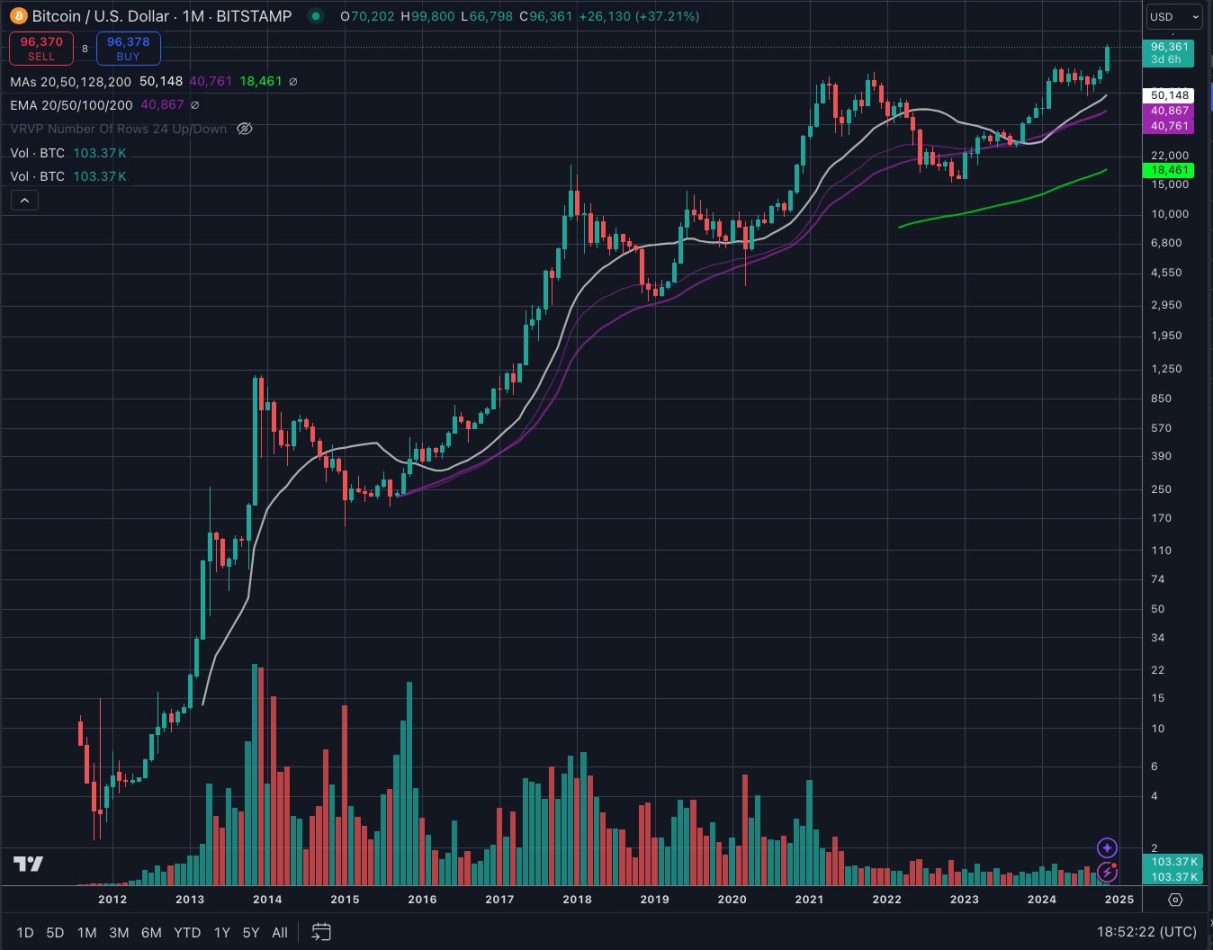Author: Chris Burnisks, Partner at Placeholder
Translation: 1912212.eth, Foresight News
If your friends reach out to you with questions about Bitcoin, Ethereum, and other cryptocurrencies, it can be challenging to guide them given the current market conditions (BTC is nearing $100,000). This is especially true when they are inexperienced novice investors. Here are some lessons I've learned from over a decade of observation.
Ensure that the actions they take are their own responsibility. You may have more experience and knowledge, but that doesn't mean you are absolutely right. No one understands everything that happens in this market. If someone claims to know it all, they are definitely lying.
You can try to explain to them what stage of the market cycle we are currently in. For me, we have been in this bull market cycle for 2 years now. (The bottom in the chart below is November 2022.)
From the bottom two years ago, BTC has risen over 6 times, ETH over 4 times, and SOL over 30 times.

The harsh truth is that as token prices rise, people's attention increases, and this attention subsequently translates into purchasing power. Therefore, the more the price rises, the more people focus on the potential for future returns. Generally speaking, the later we enter the "attention cycle," the less favorable our position is.
So the best entry point is often when almost no one is paying attention, but that was 2 years ago. What should you do when they are eager to buy tokens, even if the current entry point isn't the best?
Keep it simple: Personally, if they are novices, I would tend to recommend holding a certain proportion of BTC, ETH, and SOL (50/25/25%), with the rest of the risk on them. At least, if they mess up the "entry/exit," they can still maintain a certain amount of capital. If they choose smaller coins, encourage them to learn and keep it below 10% of their total allocated funds to reduce risk.
Based on the current entry price, if they double their investment, encourage them to take out their principal at that time, which also ensures profits. After that, if their funds have tripled, they can cash out all their funds, or if they want to be a bit more adventurous, cash out the profits they've made (2 times) and maintain the remaining principal (cost), but try to help them understand the potential for crazy drops during a bear market. (If they are staunch Bitcoin supporters and may never want to sell, that's fine, but they must be prepared to face difficulties at some point.)
Selling during a bear market is driven by panic, but exiting during a bull market becomes relatively difficult. Sometimes, if they feel they sold too early, they may resent you, but they will thank you later.
They also need to be cautious; if they choose to take profits and then can't resist re-entering the market, reinvesting those profits, if the market continues to rise, it can turn into FOMO—this thought often leads to negative consequences.
Because if the market suddenly crashes, they may find that the taxes they owe on realized gains are more than the assets they have left (this happens often).

Every sale of a crypto asset is a taxable event, even exchanging crypto assets for other crypto assets is no exception. Once I start to cash out, I plan to keep it in a principal-protected interest-bearing account in traditional finance (TradFi) for 12 to 18 months—high-yield crypto stablecoin accounts do not count as cash management because there is still crypto market risk in those accounts, and the leverage accumulated during a bull market can lead to total loss. First, I will settle my tax liabilities before I start looking for new investment opportunities again, which usually happens when people lose their minds due to panic, or ideally, when market enthusiasm wanes and people fall into apathy (this often occurs more than 12 months after the market peaks).
Although exchange-traded funds (ETFs) and potential sovereign purchases may suggest that Bitcoin (BTC) will not experience a severe bear market in the future, every time a bull market arrives, people find various reasons to justify absurdly high prices or claim that there will be no bear market.
"Super cycles" are, without exception, collective delusions.
I can see reasons for the cycle to repeat (peaking in Q4 2025) and reasons for the cycle to extend and break the four-year pattern. While we may consolidate after the inauguration of a new president in the U.S., I do not believe in the notion of shortened cycles. This is just post-bear market trauma (PTSD) at play.
That said, structurally, anything that grows at a rate of 100 times is prone to at least an 80-90% retracement at some point—mainly due to excessive profit-taking.
If SOL rises to $800 in this cycle, it may drop to $80-160 in the future (for example, in 2027). So, if someone buys at $240 and holds firmly, they will lose money in the next bear market. It is hard for people to realize this amidst the frenzy of a bull market, but since you have experienced it, you understand, and now you can teach them :)
From the current price perspective (SOL has already risen over 30 times from its low), no one can get rich or achieve crazy returns from this, but they will see others making a lot of money, making it hard to resist temptation—if you tell them not to buy and to wait because "the final crash" will bring prices below current levels, they will feel pain because, depending on the asset, there is still 2-5 times or even more upside potential before reaching a peak, making everything very unstable.
One last point I want to emphasize is that many inexperienced investors think more in terms of dollars ($) rather than in multiples (X) or percentages (%). For example, if you say SOL might rise to $1,000, they think, wow! That would increase the value of each SOL by $760! However, rising from $8 to $240 only adds $232 in value for each SOL.
What they do not realize is that rising from $8 to $240 is a 30-fold increase, while rising from here to $1,000 is only a 4-fold increase. It is crucial for investors to truly understand this.
免责声明:本文章仅代表作者个人观点,不代表本平台的立场和观点。本文章仅供信息分享,不构成对任何人的任何投资建议。用户与作者之间的任何争议,与本平台无关。如网页中刊载的文章或图片涉及侵权,请提供相关的权利证明和身份证明发送邮件到support@aicoin.com,本平台相关工作人员将会进行核查。




